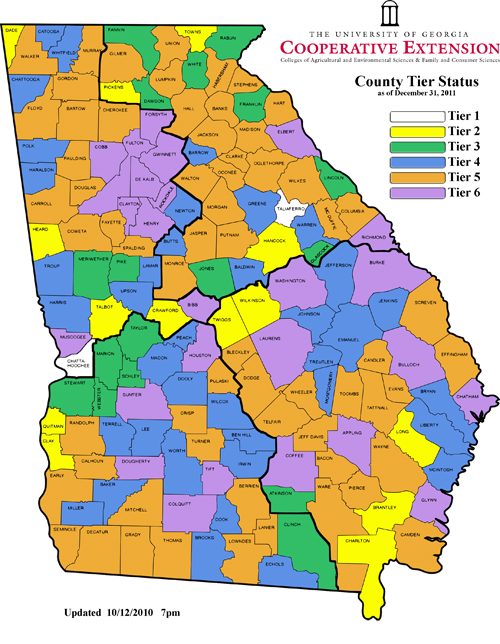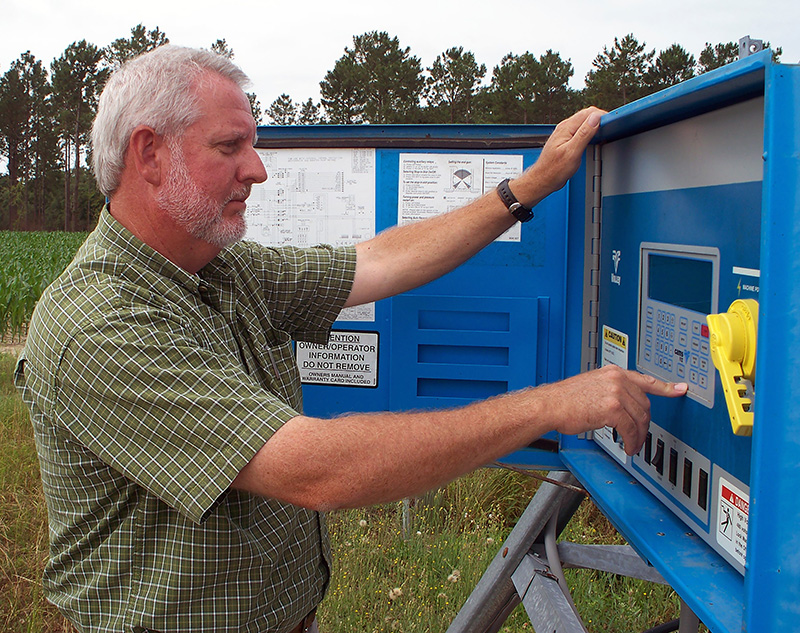In mid-October, administrators with University of Georgia Cooperative Extension announced a new system for delivering its educational programs. That new system uses set criteria to assign each of Georgia’s 159 counties to one of six service tiers. Each tier represents what kinds and levels of service counties will receive from UGA Extension.
Implementation of the system is underway and is expected take 12 to 18 months to complete.
“Our aim with this new plan was to do all we can to ensure Georgians have access to the education and information they need from us,” said Beverly Sparks, associate dean for Extension with the UGA College of Agricultural and Environmental Sciences. “It was clear with our new budget reality we had to redesign how that education was delivered.”
UGA Extension is the public service and outreach branch of the UGA colleges of Agricultural and Environmental Sciences and Family and Consumer Sciences. For more than 100 years, it has delivered research-based education from the university to agricultural producers, families and, through Georgia 4-H, children.
“Cooperative Extension may take on a new look and feel in your county, but we will do our best to continue delivering the reliable service and education across the state that you know and trust,” Sparks said.
New look and feel
Over the past two years, all Georgia state agencies have suffered budget reductions. UGA Extension’s cut has grown to 23 percent. “When you have eliminated 88 county agent, 19 state specialist and seven administrator positions, you can no longer continue to do more with less,” Sparks said. “The time has come that we have to do what we can with what we have. We have chosen to focus on what we do best.”
Under the new system, every county will have access to a 4-H program. Most counties will have a county Extension office where residents can go for help. Support varies by tier.
Tier 1 counties include Chattahoochee and Taliaferro. These counties will have no local Extension office but will have a basic 4-H program offered in the school system through an employee supervised by an agent in another county.
Tier 2 counties include Brantley, Charlton, Clay, Crawford, Dade, Hancock, Heard, Long, Pickens, Quitman, Talbot, Towns, Twiggs and Wilkinson. These counties will have a core 4-H program and a county Extension office with an office manager to help residents access diagnostic services (soil, water and forage samples) and Extension resources. A county extension coordinator from another county will serve as administrator. Agents will be assigned as resources but will not generally offer programs or make client visits.
Tier 3 counties include Atkinson, Clinch, Dawson, Fannin, Franklin, Glascock, Jones, Lincoln, Pike, Marion, Meriwether, Rabun, Schley, Stewart, Taylor, Webster and White. These counties will have a core 4-H program, a county office staffed with an office manager and a shared agent from a surrounding county who spends time in the office.
Tier 4 counties include Baker, Baldwin, Barrow, Ben Hill, Brooks, Bryan, Butts, Catoosa, Chattooga, Cook, Dooly, Echols, Emanuel, Greene, Haralson, Harris, Irwin, Jefferson, Jenkins, Johnson, Lamar, Lee, Liberty, McIntosh, Macon, Miller, Montgomery, Murray, Newton, Peach, Polk, Terrell, Treutlen, Troup, Upson, Warren, Wilcox and Worth. These counties will have a 4-H program, a county office with a secretary, one county-based agent who may be agriculture, family and consumer science, 4-H or split between these program areas.
Tier 5 counties include Bacon, Banks, Bartow, Berrien, Bleckley, Calhoun, Camden, Candler, Carroll, Cherokee, Clarke, Columbia, Coweta, Crisp, Decatur, Dodge, Douglas, Early, Effingham, Evans, Fayette, Floyd, Gilmer, Gordon, Grady, Habersham, Hall, Hart, Jackson, Jasper, Jeff Davis, Lanier, Lowndes, Lumpkin, McDuffie, Madison, Mitchell, Monroe, Morgan, Oconee, Oglethorpe, Paulding, Pierce, Pulaski, Putnam, Randolph, Screven, Seminole, Spalding, Stephens, Tattnall, Telfair, Thomas, Toombs, Turner, Union, Walker, Walton, Ware, Wayne, Wheeler, Whitfield and Wilkes. These counties will have a 4-H program, a county office staffed with at least one support position and two or more agents – one a county coordinator -- to provide educational programs.
Tier 6 counties include Appling, Bibb, Bulloch, Burke, Chatham, Clayton, Cobb, Coffee, Colquitt, DeKalb, Dougherty, Elbert, Forsyth, Fulton, Glynn, Gwinnett, Henry, Houston, Laurens, Muscogee, Richmond, Rockdale, Tift, Sumter and Washington. These counties will have a full-time coordinator with multiple agents.
The tier rankings were determined by district Extension leadership teams, Sparks said. Under the new tier system, 126 Georgia counties are classified in Tiers 4-6, which means they will have county offices, agents and 4-H programs.
“I think our stakeholders understand the very difficult situation we’re dealing with, with the state budget, and I think they understand that we have very limited resources,” Sparks said. “Now if you’re in one of those Tier 1, 2 or 3 counties you may not be as pleased with us as if you’re in a Tier 4, 5 or 6 county. But, again, I think this plan is flexible and allows us, as resources return, to build back and bring those 1, 2 and 3 tiers up to a higher tier.”





